Text
We need Peace.
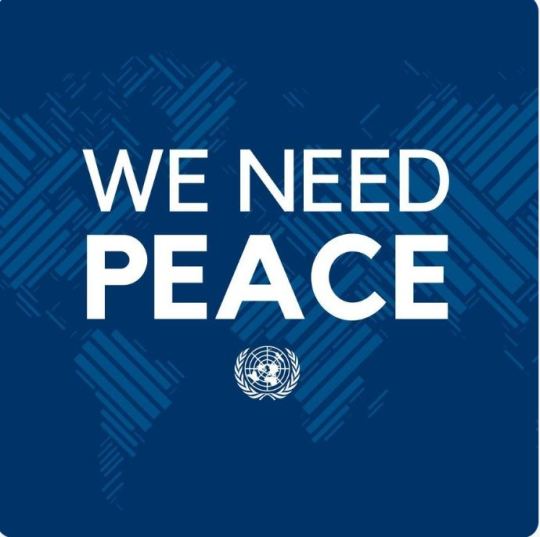
In conflict, civilians always pay the highest price. War is not the answer. We need peace.
#international day of peace#panel discussion#UN Charter#restore peace#armed conflict#promote lasting peace#prevent disputes#peaceful means#peaceful settlement#hostilities#disarmament#peaceful societies
0 notes
Text
UNESCO Series of Regional Expert Consultations on Intercultural Competencies for Peacebuilding. Fifth Edition: Arab States.

The fifth edition will bring together experts and practitioners to discuss the main challenges to intercultural understanding in the region, the role of intercultural skills in building trust among different parties, and ways of improving intercultural competence to better promote peacebuilding efforts, paying particular attention to the role of women and youth.
The fifth of the six regional editions of online expert consultations will focus on Arab States and will be held on Thursday 21 September 2023, from 15:00 to 17:00 GMT+2 (via Zoom).
On 20 June 2023, UNESCO’s Social and Human Sciences Sector launched the UNESCO Series of Regional Expert Consultations on Intercultural Competencies for Peacebuilding. Through these consultations, UNESCO aims to explore the potential of the development of intercultural and socio-emotional skills to serve as an enabler for peace in fragile, conflict-affected and post-conflict contexts.
The initiative is implemented in the framework of the “The Road to Peace: Dialogue and Action for Tolerance and Intercultural Understanding” programme, endorsed by Member States at the 214th session of the Executive Board. Inspired by the Tree of Peace, an artwork by UNESCO Goodwill Ambassador Hedva Ser, the Road to Peace programme highlights the importance of protecting shared values and promoting attitudes and behaviour conducive to dialogue, non-violence and socio-emotional resilience as key elements of democratic, inclusive and peaceful societies.
The consultations are open to the public. Simultaneous interpretation in English and Arabic will be provided for the fifth edition.
Working documents
Harnessing Intercultural Competencies for Peacebuilding (summary)
Provisional agenda for the fifth edition of expert consultations
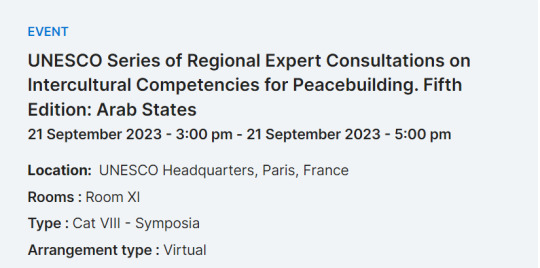
#Intercultural Competencies#peacebuilding#Arab States#intercultural understanding#intercultural skills#building trust#intercultural competence#UNESCO#Syposium#Women and youth#peaceful societies
0 notes
Text
Special Coverage of the 78th General Debate.
The stage is set for the general debate of the 78th session of the United Nations General Assembly. As the world continues to grapple with the socio-economic fallout from the pandemic and the ongoing impact of the war in Ukraine, the debate will be held fully in-person for the first time since 2019, with world leaders heading to NY to deliver their statements in the iconic Assembly Hall.

Here, UN News gives you a front row seat to all the action. From your mobile phone or computer, follow Heads of States and Government as they define responses to the world’s most pressing challenges and take part in high-level discussions on the Sustainable Development Goals (SDGs), ambitious action to end the climate crisis, and an unprecedented three summit-level sessions on heath: pandemic preparedness; universal health coverage; and the global fight against tuberculosis.
Watch the Special Coverage of the 78th General Debate
18 September – 26 September 2023
0 notes
Text
Remembering Dag Hammarskjöld.

Also on Wednesday, Mr. Guterres paid tribute to former Secretary-General Dag Hammarskjöld on the 62nd anniversary of his death.
“Dag Hammarskjöld shaped our United Nations in innumerable ways – setting new standards of public service and launching our Organization on its active career as the custodian of world peace,” Mr. Guterres said.
“His legacy endures, not as distant memory, but as a living guide for our shared mission.
“He recognized that the United Nations may be imperfect – but he knew it was indispensable. And he summoned us all to reach higher.”
Mr. Hammarskjöld and others on board were killed in a plane crash, when their chartered DC6 aircraft crashed just after midnight on 17-18 September 1961, near Ndola (then Northern Rhodesia, now Zambia). A sole survivor of the accident succumbed to injuries a few days later.
A panel investigating the crash reported, in 2017, that it “appears plausible” that an external attack or threat may have led to the fatal crash.
The General Assembly in December 2022 decided to continue the search for answers and continue the official probe.
0 notes
Text
Remarks by Michael Douglas during the Youth Event for the International Day of Peace 2023
Youth Event for the International Day of Peace 2023.
#international day of peace#political stability#economic stability#social stability#youth#panel discussion
0 notes
Text
Discourse on Peace.
The event will center around deepening our understanding of the connection between peace, security, and sustainable development, fostering a holistic approach to global harmony.

To commemorate the International Day of Peace, the Permanent Mission of India will organize a Discourse on Peace. Yoga Guru Sri Sri Ravi Shankar will grace the conference as Chief Guest.
The International Day of Peace emphasizes the resolution of conflicts through non-violent means, fostering s and the well-being of all. Peace is more than just the absence of war; it encompasses social, political, and economic stability. It also underlines the power of dialogue, education and cross-cultural understanding to prevent conflicts and promote sustainable development.
Tentative programme:
Opening Remarks by Ambassador Ruchira Kamboj, Permanent Representative of India to the United Nations
Keynote Remarks by Gurudev Sri Sri Ravi Shankar, Founder of Art of Living
Special Remarks by Mr. Miguel Moratinos, High Representative for UNAOC
Interactive Q&A Session
Breathing Exercise
Vote of Thanks
#Permanent Mission of India#international day of peace#economic stability#political stability#social stability#mutual respect#social justice#panel discussion
0 notes
Text
A youth choir from Brooklyn, New York, sings at the event.

Achieving peace is neither automatic nor a vision, Mr. Guterres said in a video message to a special event on youth for peace.
“Peace is the result of action. Let us commit to build, drive and sustain peace for all,” he emphasized.
The event showcased the actions and commitments of young people – in their communities, schools and countries – in boosting progress towards the Sustainable Development Goals (SDGs).
‘Something special’
Florence Ifeoluwa Otedola, better known as DJ Cuppy, remarked that every young person has “something unique and special” that indicates they can make the world a better place.
“That is pretty epic,” she said.
She highlighted the importance of young people for improving engagement with the wider world and as a way of helping lift each other up.
“I believe, as humans, we have to as much as we can for as long as we can […] and so can you – it’s about finding your gift and just getting started,” DJ Cuppy told UN News.
“Peace begins with you,” she added.
‘Torch bearers’
Also speaking at the event, Jayathma Wickramanayake, the Secretary-General’s Envoy on Youth recounted her own experience growing up in Sri Lanka during the civil war, wondering how the violence had become so brutal.
“I found that the root cause of the war was much deeper – it went down to discrimination, poverty and inequality,” she said, underscoring the need for dignity and development for peace.
“Youth are the torch bearers for peace, human rights and sustainable development.”
Stepping down
Ms. Wickramanayake also announced that Thursday marked the end of her tenure as Youth Envoy, ending six years of engagement with the UN.
“There is no better way to wrap up my mandate than to spend it with you,” she told the young people assembled.
Recalling her work over the years, Ms. Wickramanayake said she heard the powerful message from young people that peace goes beyond an absence of violence and strife.
It is “something bigger” she added, emphasizing that peace meant having the freedom to live your life the way you want.
‘Rescue the SDGs’
In conclusion, Ms. Wickramanayake echoed the Secretary-General’s call to rescue the SDGs.
“We need to rescue the SDGs, so through education, equal opportunities, better healthcare, decent living conditions, by addressing climate change, we can make the world more peaceful,” she said.
0 notes
Text
Bell rings out.
youtube
The ceremony included traditional ringing of the Peace Bell, which was cast in the 1950s from coins and medals donated by people all over the world, including the Pope, as a symbol of hope for peace.
The Bell is rung twice a year: on the first day of spring, at the Vernal Equinox, and on 21 September to commemorate the International Day for Peace.
The Peace Bell also rang on other special occasions, such as on 26 April 2011 to mark 25 years of the devastating Chernobyl accident.
Dennis Francis, President of the 78th session of the General Assembly, also spoke, reiterating the importance of peace for sustainable development.
“We know that sustainable development – and sustainable peace – are two sides of the same coin, one cannot be realised without the other,” he said.
Ahead of next week’s annual General Debate, Mr. Francis urged everyone to recommit to the Sustainable Development Goals (SDGs).
“Let us recommit to a world where peace and security are a reality for all.”
1 note
·
View note
Text
Peace Bell ceremony held at United Nations Headquarters in observance of the International Day of Peace 2023.
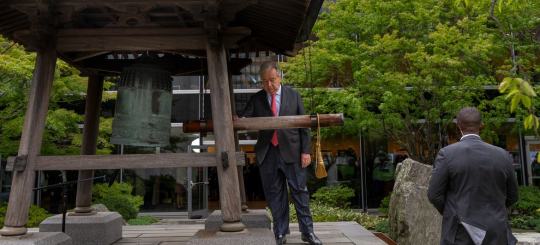
Today “peace is under assault” across communities, countries and regions, UN Secretary-General António Guterres said on Wednesday, underscoring the need for global solidarity and mutual trust.
Mr. Guterres made the appeal at a ceremony commemorating the International Day of Peace, which is observed annually on 21 September.
He emphasized the interconnectedness of peace with the wellbeing of both humanity and the environment and as a way of addressing challenges ranging from poverty and inequality to biodiversity loss.
‘Push for peace’
“For people and planet alike, we can — and we must — push for peace,” Mr. Guterres said.
Pushing for peace, he continued, encompassed not only preventing conflicts, but also addressing discrimination, supporting sustainable development and expanding opportunities for women and girls.
It also means accelerating the battle against climate change, ending the reliance on fossil fuels and adopting renewable energy.
“Now more than ever, we need global solidarity, collective action, commitment and mutual trust. Let us all pledge to be part of this push for peace.”
Two sides of a coin
Dennis Francis, President of the 78th session of the General Assembly, also spoke, reiterating the importance of peace for sustainable development.
“We know that sustainable development – and sustainable peace – are two sides of the same coin, one cannot be realised without the other,” he said.
Ahead of next week’s annual General Debate, Mr. Francis urged everyone to recommit to the Sustainable Development Goals (SDGs).
“Let us recommit to a world where peace and security are a reality for all.”
0 notes
Text
Novel approches to peace and potential domains of conflict.
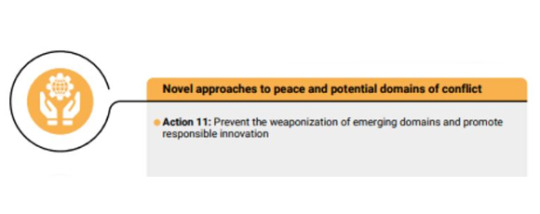
ACTION 11 : Prevent the weaponization of emerging domains and promote responsible innovation.
#weaponization#armed conflict#responsible innovation#New agenda for Peace#proposals for action#united nations secretary general
0 notes
Text
Strenghtening International Governance.
ACTION 12 - Build a stronger collective security machinery.

#New Agenda for Peace#proposals for action#International Governance#united nations secretary general
0 notes
Text
Strengthening peace operation and addressing peace enforcement.
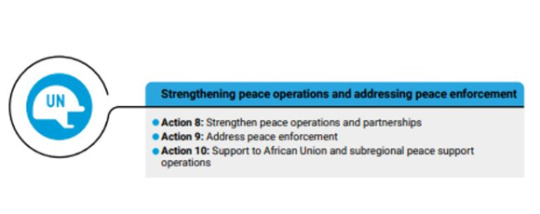
ACTION 8: Strenghten peace operations and partnerships
ACTION 9: Address peace enforcement.
ACTION 10: Support to African Union and subreional peace support operations.
#New agenda for peace#proposals for action#peace enforcement#peace operations#united nations secretary general
0 notes
Text
Preventing conflict and violence and sustaining peace.
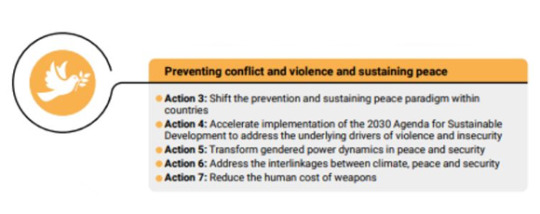
ACTION 3: Shift the prevention and sustaining peace paradigm within.
ACTION 4: Accelerate implementation of the 2030 Agenda for Sustainable Development to address the underuing drivers of violence and insecurity.
ACTION 5: Transform gendered power dynanmic in peace and security.
ACTION 6: Address the interlinkages between climate, peace and security.
ACTION 7: Reduce the human cost of weapons.
#peace and security#violence and insecurity#united nations secretary general#New Agenda for Peace#sustainable peace#human cost of weapons#climate security#agenda 2030#armed conflict#proposals for action
0 notes
Text
Introducing the ''new agenda for Peace.''
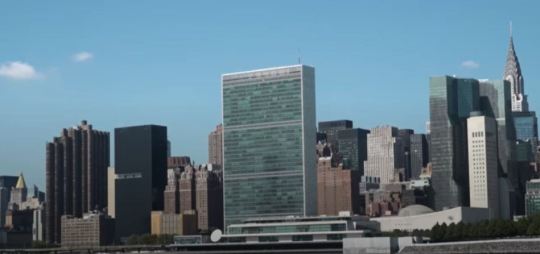
The Secretary-General, António Guterres, presented his Policy Brief on a New Agenda for Peace, which outlines his vision for multilateral efforts for peace and security, based on international law, for a world in transition.
#united nations#proposals for action#new agenda for peace#united nations secretary general#sustainable peace#peace and security
0 notes
Text
Addressing strategic risks and geopolitical division: Prevention at the global level.

ACTION 1: Eliminate nuclear weapons.
ACTION 2: Boost preventive diplomact in an era of divisions.
#nuclear weapons#geopolitical tensions#strategic risks#united nations secretary general#New Agenda for Peace#proposals for action#Preventive diplomacy
0 notes
Text
A renewed commitment to peace.
The 2022 International Day of Peace comes with the clarity of realization that past ways of working and the international mechanisms we have agreed on are not enough to stem the growing tide of polarization and conflict.
The challenges we face are immense, complex and interconnected, but they are well understood, and the solutions are becoming clearer.
As the UN’s New Agenda for Peace suggests, it is time to re-evaluate the old and the new, the risks and challenges and look at how the international community can work together to change the approaches that are not delivering results and move forward with a vision and renewed commitment to the principles of the United Nations and the Sustainable Development Goals.

0 notes
Text
A renewed vision for peace.

Addressing the root causes of conflict.
Of the world’s 8 billion people, around 1.2 billion live with some form of conflict. That number is growing every day and, as we become ever more connected, nobody is immune from its effects.
The war in Ukraine lays bare how conflict is a shared, global challenge, with its catastrophic impacts felt well beyond the country’s millions of citizens and spiking food, fertilizer and energy costs in 74 countries, presenting dire consequences for the most vulnerable.
The number of coups, failed transitions, and political deadlocks continues to rise, as do the challenges of building and keeping peace, even with all the resources of the 21st century, and sometimes because of them.
The sources of instability are ever more complex and interdependent, and many of the existing agreements of the United Nations fall short of meeting up to the challenge.
Clearly, something is not right
The United Nations was established so that we would not repeat the generation-destroying wars of the 20th century.
Nearly 80 years later, Yemen’s war has reached a fragile ceasefire after dragging on for eight years.
Afghanistan teeters on the brink of universal poverty.
Families in Yemen and Somalia face famine and starvation.
Syria has lost four decades of progress, and half its citizens are displaced.
We are seeing the return of ‘industrial scale’ warfare in Ukraine, affecting the lives and livelihoods of millions.
This year more than 100 million people are displaced or have been forced to become refugees. That’s the highest number since the Second World War.
In 2020 the cost of violence was estimated at US$14.96 trillion, or $1,942 for every person.
The challenges we face are increasingly interconnected
Left alone, we cannot expect these trends to stop, because the forces that feed conflict and division are alive and well.
Inequality has an unbeatable track record of ripping societies apart. COVID-19 is just one of the factors that has fed into human development declining for the first time since 1990, leaving the most vulnerable even further behind.
In 2020 the pandemic resulted in more than 60 percent of countries backsliding on basic rights.
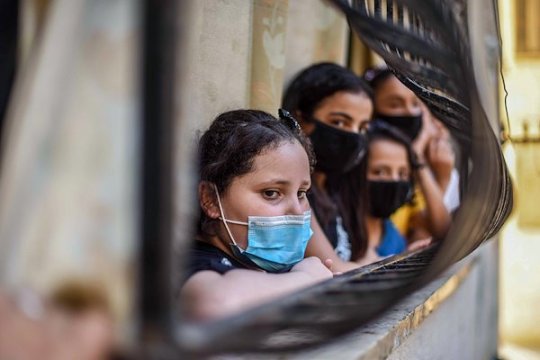
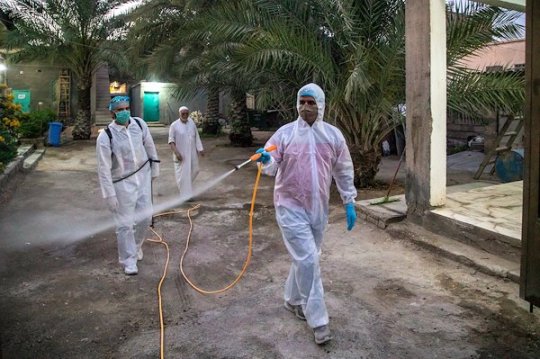
Increasingly, populations don’t trust our leaders. Social protest movements have more than doubled in the past decade. In the same period 131 countries have made no progress on corruption and 27 are at a historic low.
Despite their best efforts, women and girls are not truly recognized as equal citizens, capable of leadership. More than 80 countries have never had a female head of state. At the present rate it will take about 145 years to reach gender parity in politics. There is a direct link between lack of women in governance and higher rates of gender violence.
New domains of conflict are opening, and new tools emerging, and we do not have strong sets of rules to govern them.
The International Crisis Group has highlighted the need to address these new weapons—everything from social media, to drones, to artificial intelligence.
Laid over these is the existential challenge of the climate emergency. Even if the world reached net-zero carbon emissions tomorrow, the damaging inequalities would reverberate for decades.
Time to rethink our approach
Just as no one is immune to war and conflict, no one can solve it alone. Despite the enormity of the task that faces us, we can turn the tide if we work together.
To achieve peace, we must invest in peace—with financing, civic values and people. And to make peace sustainable, we must invest in development, recognizing the central role that institutions – formal, informal and civil alike – play in ensuring that solutions are nationally-owned, long-term and effective.
Since 2015 UNDP’s Funding Facility for Stabilization in Iraq has enabled 8.5 million Iraqis, half of them women, to return to their homes and to receive basic services. A very close partnership with local and national governments was crucial to this success, establishing confidence in Iraqi institutions.
We have to be serious about giving everybody a voice, recognizing that exclusion and shrinking civic space both undermine trust and contribute to grievances. If we want to turn the tide on growing polarization and eroding trust, we have to ensure that the decision-making process at all levels is inclusive of the diversity of voices that make up our global society.
In the Sahel we are working to unlock the tremendous potential of the region, particularly its young people, helping countries to break the cycle of poverty and conflict by investing in energy and governance and addressing the underlying causes of violent conflict and extremism.
We must also recognize the central role that communities play at the forefront of efforts to prevent conflict and build peace, ensuring that our efforts empower communities through development investments, instead of making them dependent on aid.
We see job creation as an essential part of Yemen’s recovery—a country forced to rely on aid and suffering from food shortages, not because there isn’t food but because families cannot afford it. We’ve helped more than 440,000 Yemenis find work that also builds infrastructure, such as improving healthcare facilities and schools and installing solar energy so businesses and institutions can function.
Afghans, facing widespread poverty and an aid-dependent economy that has rapidly collapsed, also desperately need work. UNDP’s ABADEI programme has created nearly 45,000 days of temporary employment in less than three months.
Overall, as outlined in Our Common Agenda, we need to re-envision how we approach multilateralism if we are going to succeed in overcoming the challenges we face as humanity.
This is why platforms like the International Dialogue on Peacebuilding and Statebuilding (IDPS) that bring together key actors in peacebuilding and state-building, are so critical. In an age of increasing polarization, IDPS offers a unique forum for open political dialogue and action which brings together countries affected by conflict and fragility, development partners and civil society organizations. As its newly appointed Secretariat, UNDP looks forward to contributing to the efforts of the IDPS constituency to ensure that our engagement on conflict and fragility, and our support in conflict settings is effective, inclusive and sustainable.
1 note
·
View note